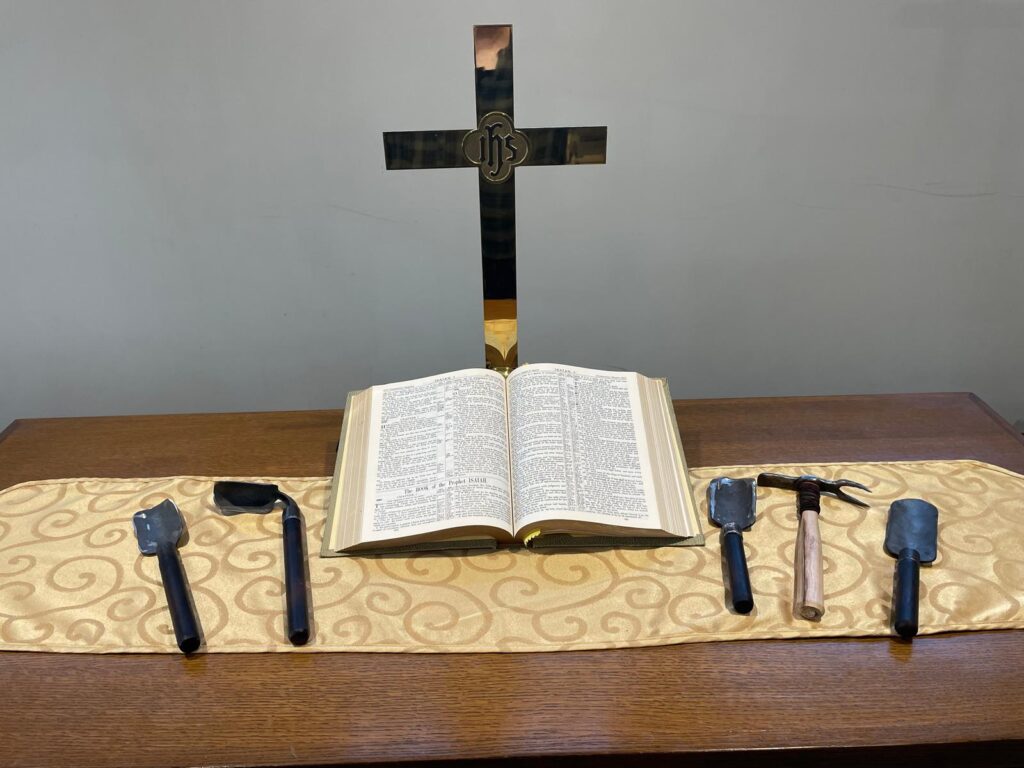House of Hope
Haiti
Click here to read the latest update
The Ecumenical Foundation for Peace and Justice (FOPJ) is a non-profit, ecumenical, Christian organization that sponsors the House of Hope in the capital city of Port-au-Prince. House of Hope is a program for children laboring as domestic servants (“restaveks”), and also assists young moms, single girls, and elderly women who have been abandoned, by providing them with a safe place where they can learn social skills such as conflict resolution and a professional trade. House of Hope also has a broader program to promote a peaceful resolution to conflict within the community through leadership development for community leaders and former gang members.
In the weeks after the January 2010 earthquake in Haiti, House of Hope was in emergency mode. The primary focus of their work was to provide meals to area children and families. They used temporary locations, providing food for up to 600 people daily, and also providing some recreation and singing for children. Former street gang members from Cité Soleil who had been part of the conflict transformation program were provided with rice to take home to their families. The buildings that House of Hope had been renting before the quake were very heavily damaged and could no longer be used. House of Hope was able to find a building which met their needs, had minimal damage, and would allow them to continue to serve people in the same area of Port-au-Prince.
House of Hope moved from its emergency mode and back toward its regular programming as quickly as possible. While they wanted to see basic needs provided for, they did not want to foster a sense of dependence by continuing to provide community meals for too long.
Life in Haiti is marked by either opulence or poverty, where those who have the wealthy lifestyle are in the minority and control and utilize the poor. House of Hope endeavors to provide support and a means of escaping the dangers poor children face daily. One House of Hope method is to provide the means for children and adolescents to attend school. Courses also are offered to help them learn peaceful conflict resolution in the hope of giving them some tools for improving their lives.
The program has 22 collaborators. They teach reading, writing, and faith development, as well as life-skills, and children’s rights. In an effort to provide income-generating skills, sewing, meal preparation, craft-making, folk dancing, and embroidery are offered. The program runs for a period of three years for adolescents, at which time it is hoped they have learned enough to continue on their own. The program also assists in the establishment of a sense of personal dignity in the participants, and offers faith and support, believing in the ability of each participant.
Each of the activities is carefully monitored by the Administrative Council and is evaluated by the collaborators for productivity and development. Each collaborator shares the difficulties and challenges faced and reports on the progress of each child. In addition, a coordinator is assigned to each program area and is responsible for monitoring the collaborators, assuring compliance with the directives of the program. All report to FOPJ on a monthly basis.
The program relies on contributions from its partners in mission. Given the target audience, it does not receive any funds from the communities it serves. It is hoped that FOPJ can receive the funds to continue ministries at House of Hope.
Update: March 2013
During 2012, House of Hope was able to accomplish all of their objectives. They have reached approximately 200 children at House of Hope I and 50 at House of Hope II. Approximately 150 teenagers have participated in their vocational school. These children and teenagers have benefited from the education, materials, and spiritual support in their centers. Forty-two children and 71 intermediary/high school students passed the new state examinations, after tutoring/studying at House of Hope.
House of Hope also supports 94 older women who have been abandoned. Twenty-one children who were working in situations of abuse as domestic workers have been reintegrated into their families with support, both socially and economically, from House of Hope.
In the course of their work in 2012, House of Hope has identified the situation of many children between ten and 17 years old who are living in extreme poverty in the urban areas where they work. These children have been entrusted to others by their parents, because there are no means for the parents to support the children, in part because of the degradation of the environment and lack of agricultural production possibilities. Many rural parents are sending their children to live with another person, who may not be even family or a friend, hoping their children with have better lives in the city. Often the situation of these children has gotten worse rather than better, as they become easy victims of different types of injustice and abuse in the homes where they are sent to live. House of Hope attempts to raise awareness and motivate all people who are concerned by this problem, and to help these children recover their rights, but financial challenges are not allowing House of Hope to complete all of the activities that are needed for this population.
Story of Rose
House of Hope shared a story about Rose, a teenager of House of Hope. Rose is the fourth of five children in her family. When she was eight years old she came to Port-au-Prince from the countryside with her father’s cousin. Three years later, her father’s cousin left the area and entrusted Rose to his aunt. This woman, who was living at Carrefour-Feuilles, has four children of her own and, since Rose was not one of her children, Rose was required to do everything for the family. Rose was going to a school beside her house, but at times the aunt stopped her from going, destroyed her books and uniforms, and beat her. Rose was living a life of hell. By the earthquake in January 2010, Rose no longer went to school, living from hand to mouth in extreme poverty. In 2011 an associate of House of Hope met her on the street in poor condition, talked to her, met her aunt, and persuaded her to send Rose to House of Hope. At first it was not easy for Rose to come into the program but eventually she was comforted and helped to be self-confident. Rose now is a girl in full bloom. She is a good student when before she could not pass her classes. Now she gets good grades and participates as a new dancer on the Dance Team.
The children of Haiti continue to face many challenges due to the extreme poverty in their country. House of Hope continues to assist these children to live a full and productive life. As the needs continue, Global Ministries welcomes gifts to assist the ministries of House of Hope.
Examples of how gifts to the House of Hope may be used:
- $10 can help provide needed school supplies
- $50 can provide approximately 120 meals – one day’s worth
- $500 can provide clothes, sandals, and other needed items
- $1,100 can provide medical support for a year
- Gifts of any amount can assist with the purchase of land and/or the building of new facilities
To read how congregations and groups have raised money for House of Hope, click here: House of Hope Donor Story
Update May 2015
The devastating effects of the 2010 earthquake on the physical structures of Haitian educational establishments and professional centers in Port-au-Prince continue to have a large impact. The House of Hope continues working with vulnerable community sectors such as children laboring as domestic servants (“restaveks”), young mothers, single girls, and elderly women who have been abandoned. They work with these groups through the key areas of education and professional training. To do this, one of their main objectives is to build a new structure, because the one they have currently is now at maximum capacity.
The new building will have two floors with four classrooms on the ground floor and three on the second floor. The usable classroom space will average 269 square feet.
In order to make this new learning center a reality, House of Hope professional staff will be training students and volunteers in the trades related to building construction techniques. Young people will be fully participating in the project, and anyone of working age will be encouraged to participate as volunteers. Once this project is done, those students and volunteers will be able to take their new skills and knowledge into the community to seek employment and/or to make other buildings more safe and secure.
The House of Hope new building project also includes the strengthening of the current auditorium with reinforced concrete. This will enable the building to better resist the effects of weather in the future, including earthquakes. A 1,023 square foot second floor also will be built to accommodate students in cosmetology training.
Global Ministries welcomes gifts to assist in the new building projects of House of Hope.
Read a donor story supporting the work of the House of Hope in Haiti.
Update May 2016
House of Hope is growing in its work with vulnerable peoples in Port-au-Prince, Haiti. Currently, House of Hope works daily with 200 children laboring as domestic servants (“restaveks”), 100 young adults, and over 60 elderly individuals. House of Hope is seeing an increase in participation in the programs they provide to the community for connecting and empowering participants to become self-sustainable – programs such as the Education and Peace program for children and young adults, the Vocational Training programs for young adults, and the Sharing and Solidarity program for the elderly. House of Hope also offers vocational training in electricity, plumbing, culinary arts, sewing, and cosmetology.
In 2015 House of Hope decided it was time to build a larger building to meet the interests and growing participation of the community. In Spring 2016, House of Hope in Haiti completed the construction and officially opened their new center, which was built with the assistance of many young adults in the community, some of whom were involved in several of the vocational training programs.
The new Center has two floors and seven classrooms – four on the first floor and three on the second floor. The second floor also holds the training and practice area for the popular cosmetology vocational program. In addition to the new building, House of Hope also renovated and corrected structural problems of their existing building so they can work with as many individuals as possible through education, classes, and programs. The children and teachers at House of Hope are already using the new facility and enjoying the new space!
Update October 2016
Hurricane Matthew
Polycarpe Joseph, Executive Director of House of Hope reports:
In the southwest region of the country, the post-hurricane situations are catastrophic. After Hurricane Matthew hit these areas of Haiti, individuals are living in terrible conditions.
House of Hope has been developing methods to encourage community development for the last five years with families in the southwest region. House of Hope provides a reintegration program for children who left domestic work and reunites with their biological families. Through the reintegration program, House of Hope facilitated the return of 42 children to 30 families in the southwest region, and coordinated the rehabilitation of homes for these families.
Hurricane Matthew has damaged or destroyed each of the repaired houses that the reunited families called home. Now, these families (about 200 people) have lost not only their homes, but also many of the components of their community and daily life. Family gardens, livestock, commercial activities, and many of the long term projects families were beginning have been destroyed. Water from the nearby river is contaminated and causing a cholera epidemic in the area, and the books, notebooks, shoes, and uniforms of these children are lost. Currently the humanitarian aid in Haiti is available in major cities, and the families in the reintegration program of House of Hope live in rural areas with limited or no access to major cities and humanitarian relief.
With the support of special gifts received for Hurricane Matthew relief, House of Hope has purchased and distributed food and materials for these families and in the community. House of Hope has provide rice, corn, noodles, cooking oil, sugar, flour, salt, water purification materials, blankets, flashlights, candles, and matches to families in the southwest region damaged by Hurricane Matthew.
House of Hope has identified three aspects of accompanying the 30 families that are involved in the reintegration program and the southwest region that has been affected by Hurricane Matthew. Two collaborators, or House of Hope staff, are present in the southwest region in order to coordinate these plans.
1 – House of Hope plans to continue providing food while food items are not readily available. In addition, House of Hope will help begin cultivating the gardens and farms in the community.
2 – House of Hope also is prepared to promote conditions and provide access for the children in these families to return to school. House of Hope also understands that the children will need new books, uniforms, shoes, and bags in order to replace these items that were lost in the hurricane.
3 – Lastly, House of Hope is to planning to accompany families in rebuilding homes, primarily through assisting in the purchase of construction materials such as sheet metal, cement, and wood.
House of Hope is working to help the families in this region to have hope and to help them to see opportunities in their lives. The rainy season in Haiti will begin in three months, and House of Hope is working to provide conditions for food security and self-sustainability for families in the region prior to the beginning of rainy season.
Update March 2017
Hurricane Matthew
Global Ministries is excited to report that House of Hope, with thanks to the generous support they received in the initial response to Hurricane Matthew, completed two of the three activities they identified for accompanying those affected by Hurricane Matthew.
House of Hope provided food and hygiene items to families in the southwest region which was the area with the most damage from Hurricane Matthew. This was the first and most immediate relief provided to families affected by Hurricane Matthew. The food distributed to families in the region included rice, corn, noodles, oil, sugar, flour, and salt. The hygiene kits included chlorine, blankets, candles, matches, soap, toothpaste, and towels.
In addition, House of Hope accompanied the 30 families they began working with many years ago to reestablish their income-generating activities. Together, House of Hope and the families revitalized the gardens of families; purchased pigs, chickens, and goats; and restocked small shops run by the families. One income-generating activity that is still being re-established is the repair and re-installation of two corn mills, which were operated by a several individuals from the 30 families.
The second expression of accompaniment House of Hope identified was to ensure the children of these families return to school. In November 2016, the schools in the region were reopened for students. However, prior to returning to school, the school required students to have school uniforms, books, notebooks, and shoes. House of Hope worked with each family and child individually to ensure whatever materials were lost or ruined by the hurricane were purchased so that their children could begin attending school again. House of Hope was able to provide this assistance, and ensure the 42 children returned to school as soon as the schools reopened, because of the financial support they received in response to Hurricane Matthew in Haiti.
House of Hope is focusing on their third identified priority for accompanying families affected by Hurricane Matthew: to assist in the rebuilding of homes of the 30 families. Through discussions with the families and research on the costs of materials, House of Hope is raising funds to purchase the cement, sheet metal, wood, and nails required for the reconstruction of each home. The families will purchase the remaining materials for their homes. The cost of materials necessary to rebuild the homes of the 30 families totals $4,500 per home. House of Hope is raising funds for this effort as they continue accompanying these families.
Update November 2018
House of Hope in Port-au-Prince, Haiti, offers a safe space and educational program for at-risk children in the area. In addition to its education programs, House of Hope assists young moms, single girls, and elderly women who have been abandoned and provides them with a place to learn social skills, practice conflict resolution, and work on professional and leadership development. While attending House of Hope, children have access to meals helping in their physical and mental development. Children and women in the Port-au-Prince area face many structural injustices. Many families in the area cannot feed their children and have a hard time finding quality education. Many children grow up hungry, with only one meal a day and often face community threats, such as gang violence, making it hard to learn.
Over the past year and a half, House of Hope has accomplished many of its goals. In 2016 and 2017, close to 200 new children were enrolled in the educational programs, with over 95% finishing the program and passing their state exams. In the vocational schools, close to 95% of the students successfully completed the program. Beyond the school curriculum, students learn skills in cosmetology, sewing, embroidery, cooking, hand crafts, and computer skills—efforts to help them find sustainable work for the duration of their lives. All children that participate in House of Hope programs benefit from educational formation, enriching spiritual life, and professional development. These strengthen the children by building self-confidence, enhancing faith, and expanding hope and resilience.
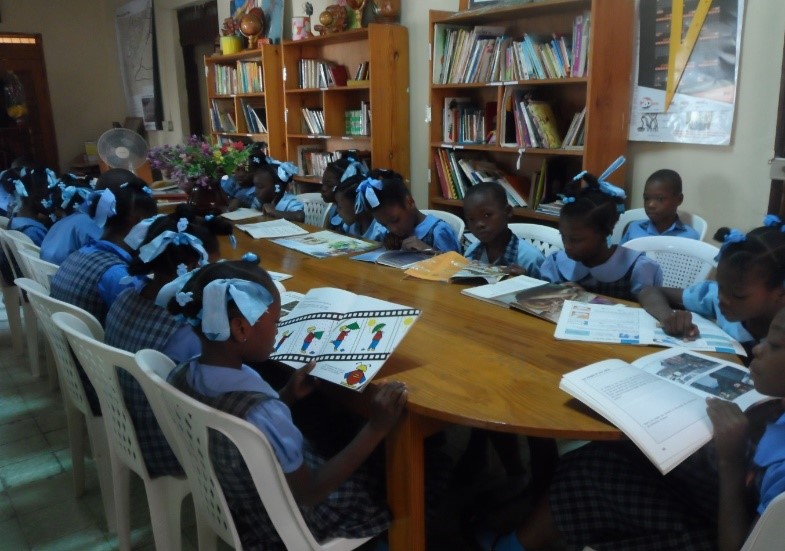 The successes of House of Hope can be seen in their students. Fanny, 16, was born in Port-au-Prince. Her mother died in 2012 and this sudden tragedy threw the family into an unstable situation. Their father was unemployed, leaving the children unable to attend school due to the fees. In late 2016, a local partner of House of Hope who lived close to Fanny and her family referred the children to the program. Fanny and her younger sister began school, and it was the first time since the death of their mother that they both were able to complete a year of school in its entirety. Fanny achieves good grades in her class and hopes to continue to become a doctor and give back to her community.
The successes of House of Hope can be seen in their students. Fanny, 16, was born in Port-au-Prince. Her mother died in 2012 and this sudden tragedy threw the family into an unstable situation. Their father was unemployed, leaving the children unable to attend school due to the fees. In late 2016, a local partner of House of Hope who lived close to Fanny and her family referred the children to the program. Fanny and her younger sister began school, and it was the first time since the death of their mother that they both were able to complete a year of school in its entirety. Fanny achieves good grades in her class and hopes to continue to become a doctor and give back to her community.
In the coming year, House of Hope seeks to build a technology lab with computers and tablets to teach students new skills that they can use throughout their lives. Global Ministries welcomes gifts for the continued work of House of Hope in Haiti.
Update December 2019
The children participating at House of Hope in general thrive, with usually about 90% of the almost 200 children finishing their school year. Almost all of those who take state exams, pass.
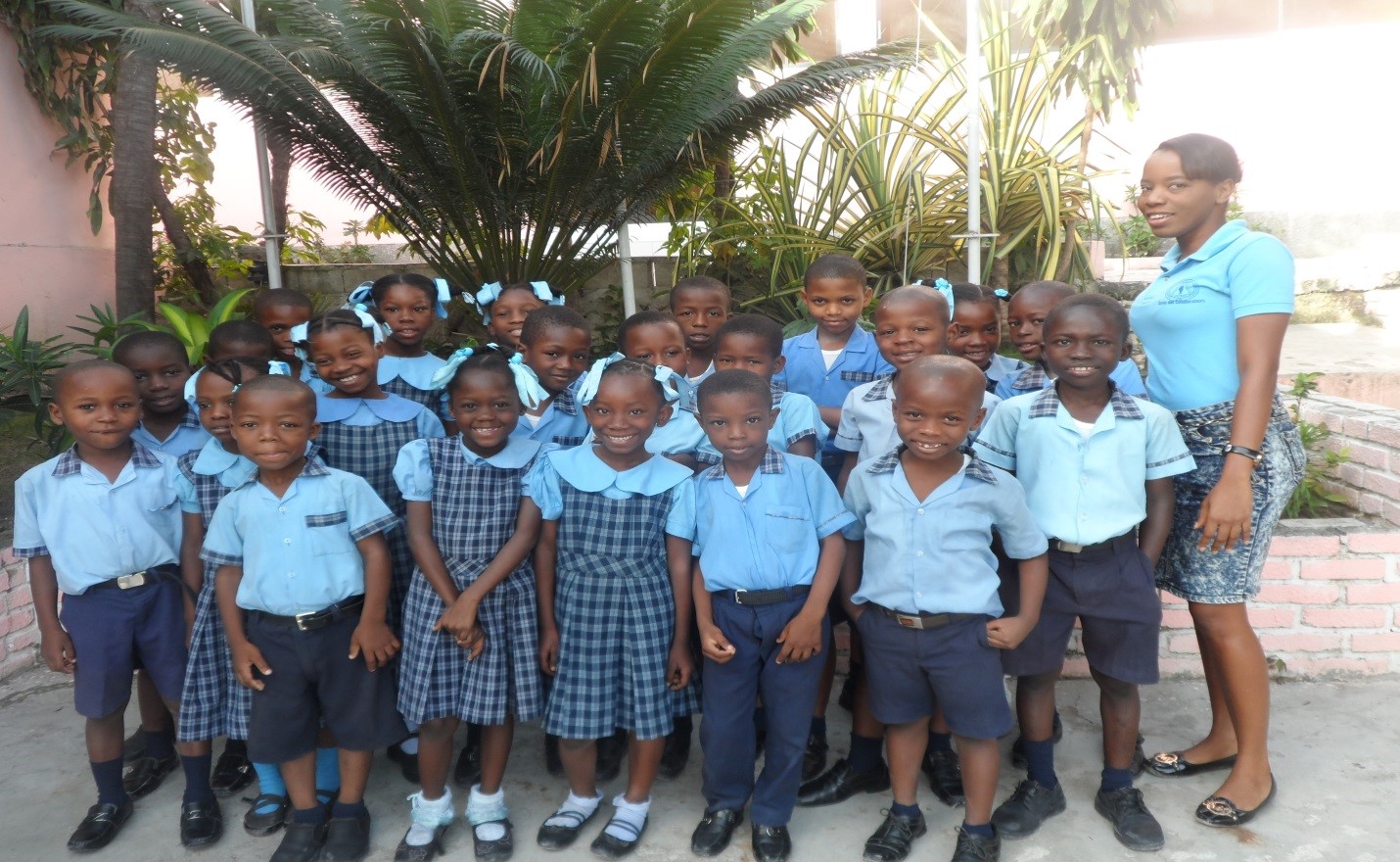 During House of Hope’s camp each August, 300 to 350 people from the surrounding neighborhood are welcomed every day.
During House of Hope’s camp each August, 300 to 350 people from the surrounding neighborhood are welcomed every day.
House of Hope’s vocational school program is active. The third graders learn basic cooking skills and the fourth graders take classes on sewing and embroidery. The fifth and sixth graders have a cosmetology class, and everyone learns computer skills.
The House of Hope program that cares for local seniors, Sharing and Solidarity, has fifty regular attendees who come twice a month to receive medical attention or food kits.
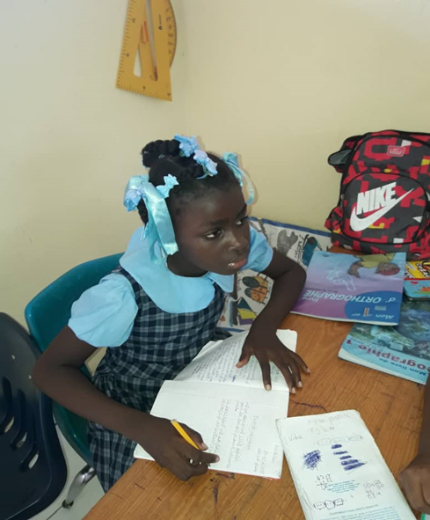 House of Hope Shares the story of Saisha: Saisha is a girl who is lives in Carrefour Feuilles with her family. Her mother and father, who has been blind for many years, have struggled to make ends meet.
House of Hope Shares the story of Saisha: Saisha is a girl who is lives in Carrefour Feuilles with her family. Her mother and father, who has been blind for many years, have struggled to make ends meet.
Several years ago, because Saisha did not attend school, her mother asked House of Hope to help send Saisha to school. So, Saisha entered the House of Hope program, and now goes to school with the other children. Saisha is a very smart girl. Since starting school she has scored high grades. She has a lot of abilities and learns quickly. Saisha’s story offers hope to many children in similar situations.
Update May 2020
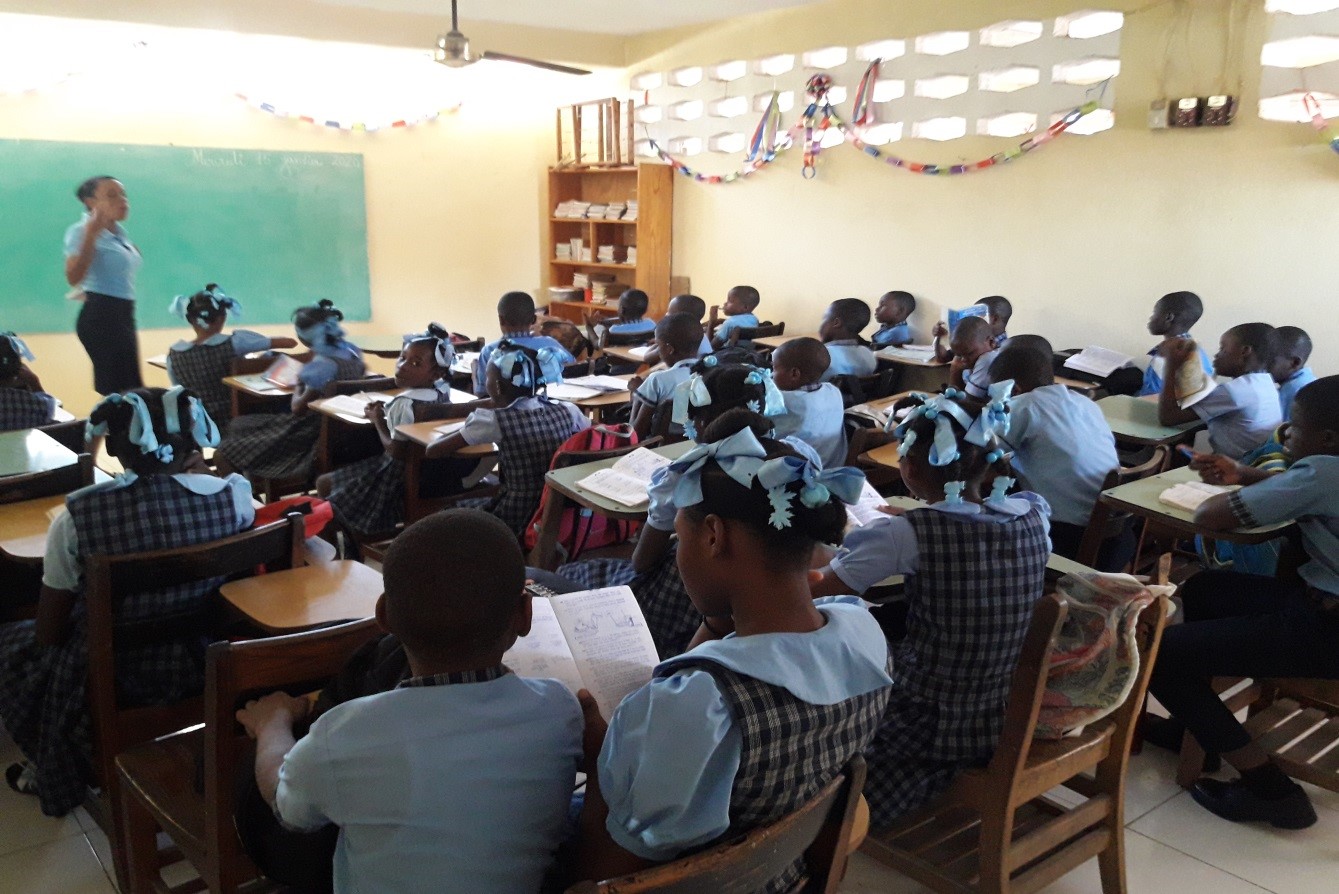 House of Hope shares that 2019 was a very difficult year for many Haitians as they experienced political instability followed by violence last fall. House of Hope was forced to suspend classes due to the unrest but continued to walk alongside 350 families providing them with food, medical care, financial support, and psychological assistance. House of Hope resumed classes in mid-December and children were able to complete their December exams.
House of Hope shares that 2019 was a very difficult year for many Haitians as they experienced political instability followed by violence last fall. House of Hope was forced to suspend classes due to the unrest but continued to walk alongside 350 families providing them with food, medical care, financial support, and psychological assistance. House of Hope resumed classes in mid-December and children were able to complete their December exams.
Currently, House of Hope recognizes that many of its students are deeply affected by the daily instability that continues. House of Hope remains committed to walking alongside these children and their families to support the children holistically.
House of Hope shares the story of Marie: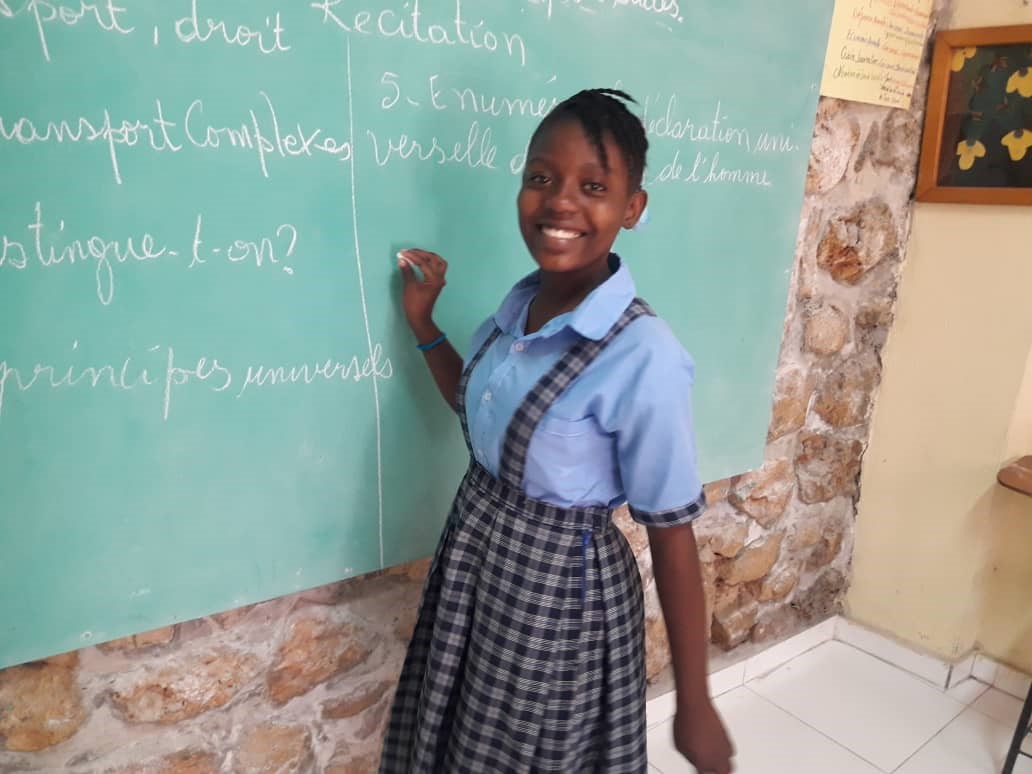 Marie’s mother, Violette moved to Port-au-Prince after her husband died, and she has been working to provide for her six children ever since. Following the death of her husband, Violette could not afford to send her children to school with what she earned. In 2015, Violette heard about House of Hope from a neighbor. Violette spoke with House of Hope staff members, and enrolled Marie at House of Hope that September. Marie has progressed in her studies over the last five years. She is a dedicated student. Today, she is a 6th-grade student who dreams of becoming a nurse so that she can one day help other people.
Marie’s mother, Violette moved to Port-au-Prince after her husband died, and she has been working to provide for her six children ever since. Following the death of her husband, Violette could not afford to send her children to school with what she earned. In 2015, Violette heard about House of Hope from a neighbor. Violette spoke with House of Hope staff members, and enrolled Marie at House of Hope that September. Marie has progressed in her studies over the last five years. She is a dedicated student. Today, she is a 6th-grade student who dreams of becoming a nurse so that she can one day help other people.
COVID-19 Response
House of Hope shares about their response to COVID-19 in Haiti. The staff and teachers are working to educate children and their families on the best health practices during this time. In-person classes have been suspended and, for those with internet accesses, House of Hope teachers are offering virtual lessons. For students without access to the internet, teachers are preparing lessons and homework, which is picked up from the school by parents on Monday and returned to the school and completed by Friday. House of Hope is continuing to provide food for children and the elderly as well.
Update September 2020
House of Hope faced significant challenges throughout 2020. With the first positive cases of Covid-19 appearing in Haiti at the beginning of the year, schools were closed, and many community programs and services were paused. During this period, House of Hope continues to find creative ways to support their program participants and to adapt to the situation at hand.
As part of their Covid-19 response, House of Hope began to immediately assess the ways in which it is uniquely suited to assist the local community. House of Hope has worked to raise community awareness about the dangers of the pandemic through educational workshops, and hosted classes for the community to learn how to make personal face masks. House of Hope continues to distribute food and supplies to vulnerable families in their community while looking for ways to continue their other programs. Even though the Covid-19 pandemic has disrupted many of the services House of Hope typically provides, their work is guided by the overall objective to assist and to care for the vulnerable in their community.
In looking toward the future, House of Hope will continue to provide services to their community and remain flexible to adapt to new priorities as they arise. In many ways, the Covid-19 pandemic has compounded daily challenges for the people in Haiti, making the work of House of Hope more important as they support children in the community and provide opportunities for them to live full and productive lives.
Update September 2021
Response to August 2021 Earthquake:
On August 14, a 7.2 magnitude earthquake struck the southern part of Haiti particularly affecting the areas of Nippes and Grand’Anse. Th earthquake destroyed more than 37,000 houses and more than 2,207 people have died. Over a million people have been affected in some way.
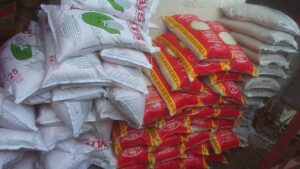
For several years, the Ecumenical Foundation for Peace and Justice (FOPJ), which runs House of Hope, has had a sustained effort to accompany forty-seven families in the Grand’Anse department. That has been part of its work to promote and protect children’s rights. Five years ago, they were all victims during the passage of Hurricane Matthew. Unfortunately, because of this recent earthquake, many of these families lost everything. Each family was provided food kits containing staples like rice, corn, flour, oil, beans, sugar, and water. Families were also provided hygiene kits and transportation.
FOPJ is responding by working alongside these families providing food, medicine, and first aid kits. In the future, as FOPJ continues this accompaniment they will focus on the rebuilding and repairing of homes and seek long-term solutions to food insecurity.
2020-2021 School Year
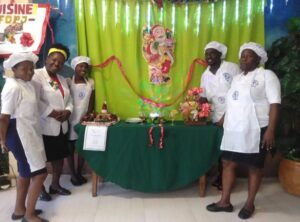
House of Hope began the 2020-2021 school year on October 12th, of 2020 with an enrollment of 201 children. An additional 53 students participated in its professional centers which offer training in culinary, electrical, and cosmetic skills and 47 students received their professional aptitude certificate in one of those areas. The first semester began without issue and examinations were held in December. During this time House of Hope continued its accompaniment alongside senior adults providing medical care and food assistance. The school year ended well in June, and teachers and students began a new academic year on September 6, 2021.
House of Hope reports that it continues to hold each of the families it works with in prayer as many families in Haiti are experiencing a deteriorating standard of living at this time.
House of Hope shares the story of Beatriz:
Beatriz was born in 2010, and when she was still a young child her mother died of a chronic illness. Following her mother’s death her aunt cared for her. Coping with her mother’s death, Beatriz was not developing well and when she reached school age, she was not ready to attend school. Then, in 2016, she began attending school at House of Hope. The first several months at House of Hope were hard for Beatriz. However, as she adjusted, she began to thrive at House of Hope. Beatriz now enjoys school and has a strong desire to learn. Beatriz is now in 5th grade and has hopes of becoming a doctor.
Update: December 2022
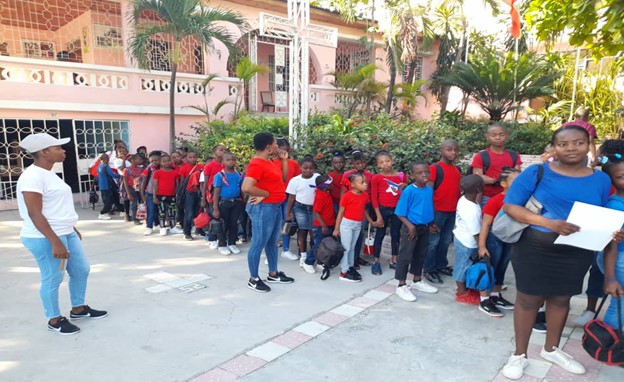
During the last year, FOPJ had to adapt to the situation of the country in many ways. A few accomplishments from the last year included several organized psycho-social activities and excursions and two meetings on child protection for parents and community leaders. Additionally, 28 young people from the professional center took part in the state exams at the beginning of June and almost all the children from the House of Hope successfully completed the academic year. Another celebration included the end-of-the-year party where children, parents, and the FOPJ team came together for a moment of thanksgiving.
Looking ahead, as required by the minister of national education, House of Hope plans to build four new classrooms to allow children to continue their studies and training until the 9th grade. In Grand‘Anse, House of Hope also intends to help several families rebuild their homes that were destroyed by the earthquakes. This is a service that House of Hope has provided after several recent natural disasters.
Louise
Louise is ten years old, and she has one younger brother. Several years ago, Louise’s mother passed away. After her death, Louise and her younger brother moved in with their aunt, while her dad left to find work and send back any money he could. With little opportunity for employment, Louise and her brother had little to eat and few options to attend school. One day, Louise’s father heard about House of Hope.
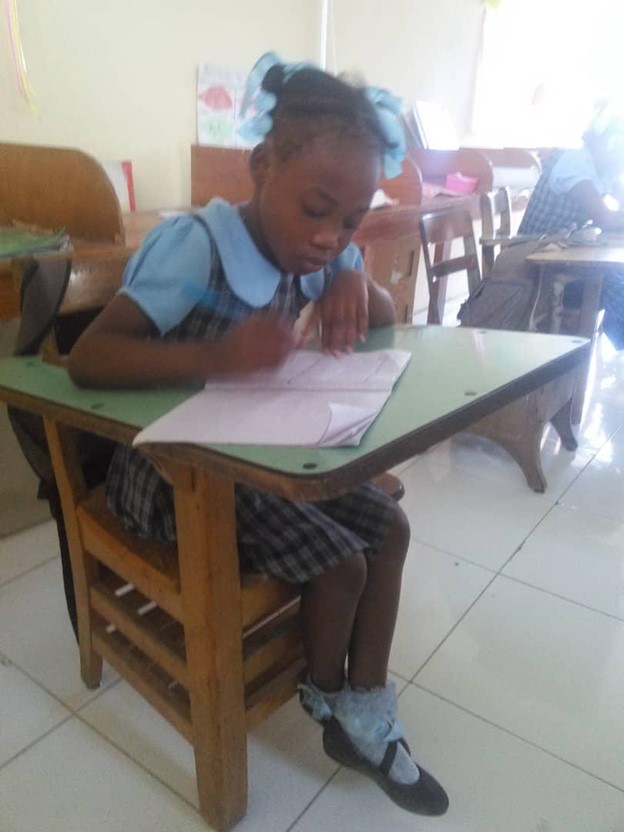
In 2018, Louise and her brother first arrived to House of Hope and began attending school. She struggled her first year, as it was her first year in school. After the first year, however, she developed more skills and started to read, write, and solve math equations. She also developed other abilities, such as singing and dancing.
Louise has grown tremendously in self-esteem over the recent years, and she loves to participate in class. Her desire is to become a nurse so that she can help people who are suffering and those who have no money.
Support this Ministry
To make a gift for this ministry online or by check use the online donation page.
- 100% of your gift will be directed to House of Hope
- You will receive updates on the work in this area as they become available
- Share in the vision of God’s abundant life for all people
Related Content
Faith in Motion: Serving and Learning Across the Caribbean
Global Mission Intern January Newsletter Partner: Caminante (Dominican Republic) My global...
Read MoreThey Will Pound Their Swords into Rakes
A mission co-worker’s journey through hospitality, faith, and a garden where peace takes root...
Read MoreGlobal Ministries is Saddened to Learn of the Death of Rev. Gustav Henry “Gus” Kuether
Global Ministries is saddened to share the news of the passing of Rev. Gustav Henry "Gus" Kuether...
Read More

